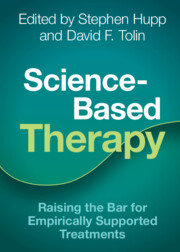Book contents
- Science-Based Therapy
- Series page
- Science-Based Therapy
- Copyright page
- Dedication
- Contents
- Tables
- Contributors
- Preface
- Acknowledgments
- 1 What Is Science-Based Therapy?
- 2 Depressive Disorders
- 3 Bipolar Disorder
- 4 Anxiety Disorders
- 5 Obsessive-Compulsive Disorder
- 6 Posttraumatic Stress Disorder
- 7 Dissociative Disorders
- 8 Pain
- 9 Eating Disorders
- 10 Insomnia Disorder
- 11 Sexual Dysfunctions
- 12 Substance Use Disorders
- 13 Cognitive Loss
- 14 Antisocial Behavior
- 15 Borderline Personality and Other Personality Disorders
- 16 Psychosis and Schizophrenia
- 17 Autism Spectrum and Intellectual Developmental Disorder
- 18 Attention-Deficit/Hyperactivity Disorder
- 19 Tic Disorders
- 20 Couples Discord
- 21 Psychotherapy Relationships
- Postscript
- Index
- References
12 - Substance Use Disorders
Published online by Cambridge University Press: 10 January 2025
- Science-Based Therapy
- Series page
- Science-Based Therapy
- Copyright page
- Dedication
- Contents
- Tables
- Contributors
- Preface
- Acknowledgments
- 1 What Is Science-Based Therapy?
- 2 Depressive Disorders
- 3 Bipolar Disorder
- 4 Anxiety Disorders
- 5 Obsessive-Compulsive Disorder
- 6 Posttraumatic Stress Disorder
- 7 Dissociative Disorders
- 8 Pain
- 9 Eating Disorders
- 10 Insomnia Disorder
- 11 Sexual Dysfunctions
- 12 Substance Use Disorders
- 13 Cognitive Loss
- 14 Antisocial Behavior
- 15 Borderline Personality and Other Personality Disorders
- 16 Psychosis and Schizophrenia
- 17 Autism Spectrum and Intellectual Developmental Disorder
- 18 Attention-Deficit/Hyperactivity Disorder
- 19 Tic Disorders
- 20 Couples Discord
- 21 Psychotherapy Relationships
- Postscript
- Index
- References
Summary
Using the new criteria for empirically supported treatments, cognitive-behavioral therapy and contingency management were both given strong recommendations for substance use disorders. Credible components of treatment include skills training, motivational enhancement, and access to nondrug alternative reinforcement. A sidebar discusses mutual support organizations such as Alcoholics Anonymous. Another sidebar describes harm reduction strategies.
Keywords
- Type
- Chapter
- Information
- Science-Based TherapyRaising the Bar for Empirically Supported Treatments, pp. 193 - 217Publisher: Cambridge University PressPrint publication year: 2025

